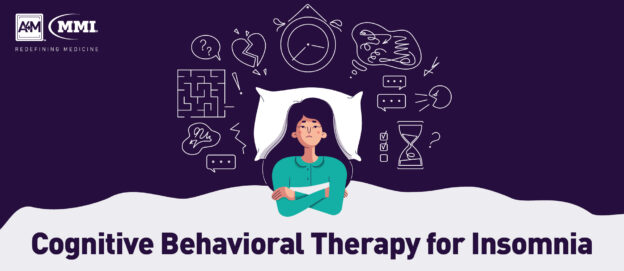Up to 32.5% of all adults in the United States report sleeping for less than seven hours per night on average despite needing between seven and nine hours of sleep. The problem of insomnia affects between 10% and 35% of adults, varying in duration, severity, and treatment outcomes. For some, insomnia can present as a brief problem while other patients may struggle with severe, chronic insomnia – both can have a negative effect on overall health, increasing the risk of mental health disorders, lowering quality of life, and raising blood pressure.
Sleeping medications are often prescribed to help patients resume a normal, healthy sleep schedule although these risk dependency and may lead to unwanted side effects. Cognitive behavioral therapy for insomnia, also known as CBT-I, is short, structured, and evidence-based approach to combating insomnia that can benefit the majority of patients with sleep problems. CBT-I can be beneficial for individuals with primary insomnia as well as those with chronic pain and mental health disorders.
Cognitive Behavioral Therapy for Insomnia
Usually the first line of treatment, cognitive behavioral therapy can help patients overcome insomnia with long-lasting effects unlike sleep medications. A pharmacologic approach can be effective as a short-term intervention for immediate relief, however, it is not recommended as a long-term insomnia treatment. Cognitive behavioral therapy for insomnia can often be the best treatment choice for patients with long-term sleep problems, those worried about becoming dependent on sleep medications, and for those in whom the risks and side effects of medications outweigh benefits. Rather than merely relieving symptoms, CBT-I addresses the underlying causes of insomnia. While it requires significant time and effort to work effectively, the results are often long-lasting even in cases of insomnia recurrence – which happens frequently.
Therapeutic Interventions and Techniques
During CBT-I treatment, the primary focus is on exploring the connection between thought patterns, daily behaviors, and sleeping habits as well as its relation to insomnia. CBT-I professionals can help patients identify the specific factors contributing to their insomnia symptoms while closely examining unhelpful behaviors to work towards restoring restful sleep.
The behavioral component of therapy can help patients develop habits that are conducive to healthy sleep while eliminating behaviors that can promote insomnia. Cognitive interventions – including changing inaccurate or unhelpful thoughts about sleep – work to improve a patient’s relationship with sleep and psychoeducational interventions provide information about the connection between thoughts, feelings, behaviors, and sleep that are central to the results of CBT-I.
Often, cognitive behavioral therapy for insomnia incorporates a combination of techniques, some of which are listed below, depending on individual patient needs.
Stimulus Control Therapy – This method focuses on eliminating factors that condition the mind to resist sleep. Approaches can include maintaining a consistent bedtime and wake time, avoiding naps, and leaving the bedroom if unable to fall asleep within 20 minutes.
Sleep Restriction – Frequently laying in bed awake can become a habit that further contributes to poor sleep quality. This method reduces the amount of time spent in bed to cause partial sleep deprivation and promote a more restful sleep the following night.
Sleep Hygiene – A primary component of CBT-I, sleep hygiene involves basic lifestyle interventions aimed at promoting healthy sleep patterns, such as avoiding smoking or drinking caffeine late in the day. Recommended behaviors include the introduction of relaxation practices like meditation, imagery, and muscle relaxation.
Paradoxical Intention – Worries about not being able to fall asleep can actually keep people awake. This intervention avoids any effort to fall asleep by remaining passively awake and can paradoxically promote relaxation making it easier to fall asleep.
Treatment and Results
Involving several techniques to address cognitive, behavioral, and educational factors, multi-component CBT-I has been found to improve primary insomnia in as many as 70% to 80% of patients. Treatment usually lasts between 6 and 8 sessions although, the duration can vary depending on individual needs. Reported benefits include less time to fall asleep, more time spent asleep, and waking up less during sleep.
Key Takeaways
CBT-I is scientifically proven as a highly effective way to combat insomnia without relying on medications. As a goal-directed therapy addressing multiple components, it can equip patients with a skill set that can manage insomnia recurrences later in life as well.
Sleep disorders are prevalent among the population and require the intervention of clinicians with comprehensive functional medicine training. Our Sleep and Pain Certification courses focus on the detection, prevention, and treatment of sleep disorders as well as chronic pain, which can have a significant effect on sleep. Learn more about available workshops here.

